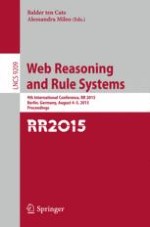This book constitutes the refereed proceedings of the 9th International Conference on Web Reasoning and Rule Systems, RR 2015, held in Berlin, Germany, in August 2015. The 5 full papers, 4 technical communications presented together with 4 invited talks were carefully reviewed and selected from 16 submissions. The scale and the heterogenous nature of web data poses many challenges, and turns basic tasks such as query answering and data transformations into complex reasoning problems. Rule-based systems have found many applications in this area. The RR conference welcomes original research from all areas of Web Reasoning and Rule Systems. Topics of particular interest are: answer set programming, complex events, datalog, description logics, event-condition-action rules, information extraction, and logic programming.
